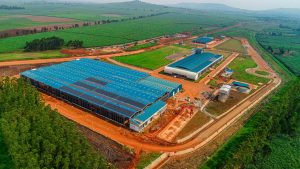
#OutToLunch: If girls can learn to shoot a gun, they can learn to code too
By Denis Jjuuko A young girl in a school uniform surfaced on a video over the weekend. Perhaps in the lower ages of her teens, she walks majestically in an open field. It is some kind of event. The person on the microphone is ecstatic. The crowd is roaring with joy. They have probably seen this girl before do some performance. Whoever is shooting the video only focuses on the teenager. It is not clear where the video was taken but somewhere in Africa. Somebody said it was South Sudan. When she reaches the middle of the field, she confidently picks up one of the deadliest weapons ever made — the AK47 gun. She points it in the air as if she is going to shoot but she doesn’t. She instead starts to disassemble it. The crowd roars at every part removed. Within no time, she re-assembles the AK47 gun. The crowd has never cheered like this before. Her mission is done. Puts the gun down and walks away. The video ends there. I would have wanted to watch more to get the context of the entire event and what drives an entire country to gather to watch teenage school girls disassemble and reassemble automatic assault rifles. Is it about defending their country which in most cases means keeping politicians in power? Is it self-defense? Or building a significant base of future innovators that can go make better guns than the AK47? Unfortunately, it was hard to get answers to such questions from the video clip. But it keeps one thinking about the education policy of some of these African countries. Previously, African leaders had such courses branded patriotism and empowering the masses to defend themselves. The gun, particularly the Ak47, had been used to terrorize people and there was a need to demystify it, the African leaders argued. They enrolled thousands of post-primary students in such courses. The countries remain largely poor decades later. I am not so sure how long it takes to teach a kid how to learn the intricacies of assembling an AK47. It must be some good training and some good resources. Military trainers, securing a suitable venue, guns, bullets, and all that. And then much more money to organize the “graduation” event where the learners showcase their impeccable skills with the AK47 and perhaps other types of guns. The majority of these AK47 graduates will most likely not finish their formal education like is the case in Africa. Very few kids who enroll into primary make it to university or other tertiary institutions. Many actually don’t complete their secondary education. And looking at that girl in the video, perhaps the only skills she will ever have are those to do with the AK47. What is she going to do with such skills? Unless she joins the military, she may end up in a militia that seeks to topple those who trained her or into some law breaker of repute. There are many 21st century skills that young girls need to acquire ahead of learning how to shoot a gun. Digital skills are crucial to make young people competitive and if they can learn to assemble a gun, they can learn to code too. They are more likely to earn better coding than shooting guns. They are more likely to contribute to the development of their countries with digital skills than impeccable gun skills. That doesn’t mean that there is no need to secure a country but that should be left to those who are recruited into the armed forces. The majority of people don’t need military education. They need skills that can land them jobs to feed their families, pay taxes to run the country and ultimately fulfil their potential. The politicians need to think beyond themselves. Look at South Sudan where the video is said to have been made. Two old men can’t control their egos so they decide to fight each other instead of using their massive natural resource endowments to create a prosperous country. Countries don’t develop because the masses can shoot a gun. They do when the masses have skills necessary that make them competitive in the world. Imagine if that girl instead of an AK47, she was displaying coding skills?

